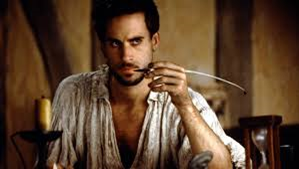an historical-romantic, tragi-comical, post-modern, sentimental mystery
by Douglas Messerli
Marc Norman and Tom Stoppard (screenplay,
based on a script by Marc Norman), John Madden (director) Shakespeare in Love / 1998
Unable to write and, apparently, sexually unstimulated, the young, lonely Will (Joseph Fiennes) in London is having a difficult time of it, shifting between acting and writing, while having to appease the theater owner’s commitments and the actors’—particularly in the instance of Richard Burbage (Martin Clunes)—vanity. Promises are made and broken, producers are tortured for non-payment, and behind-the-curtain deals are made, while the government, in the form of The Master of the Revels, Edward Tilney (Simon Callow) threatens to close down all theaters.
Always with Elizabethan theater, and particularly with Shakespeare, given the demand that only males perform in the theater, the very issue of drag creates a slight frisson for LGBTQ+ audiences, and particularly in this case, where Will believes he is in love with a boy who actually is a female in male drag, it appears the film might move toward a gay romp. Alas, Norman and Stoppard, along with Madden’s direction takes us into total heteronormative territory as quickly as possible, despite the fact that in this instance it is because Viola is not a male that they must keep their love a deep secret.
Will’s chase leads to the home of Lord and Lady de Lesseps, who are
about to the marry off their daughter to the crude and money hungry, yet
royally-connected Lord Wessex (Colin Firth). In search of the young actor Kent,
Shakespeare interlopes upon the party, in a dance coming face to face with the
beautiful Viola, thunderously falling in love. Threated by the jealous Wessex,
the playwright gives his name as Kit Marlowe, thus unintentionally threatening
the other’s life, which later becomes a major element of the plot when Marlowe
is killed in a bar, with the young Will believing he was the cause.
Married off to Wessex, Viola nonetheless escapes to watch the play, in
which, when news spreads that the male-Juliet is ill, she suddenly discovers
herself again acting, this time playing out on stage what the couple has been
exploring in the wings. Even Queen Elizabeth (in the form of the magisterial
acting of Judi Dench) enters the scene to save the day and award Shakespeare
the money from an earlier wager that theater can somehow be true to life.
If the film seems to be a grand pastiche, it would appear that the
authors’ have gotten their point across. For the charm of this work is that,
despite its declarations for realist theater, it is a post-modern mish-mash
that works against most realist conventions, tossing numerous anachronisms,
illogical plot developments, snippets of lines from other Shakespeare and
Elizabethan dramas, ridiculous skits with dogs, and the shit and slops of the
London streets all into the same pot. That it all somehow works, coming
together to provide its audience with a truly wry lark, as theater producer
Philip Henslowe (Geoffrey Rush) keeps insisting, is a mystery.
Los Angeles,
June 13, 2015
Reprinted from World Cinema Review (June 2015).






No comments:
Post a Comment